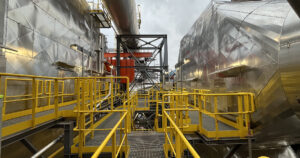
Ukraine could become a European lion in terms of economic growth, but it must continue with the necessary reforms, emphasized International Monetary Fund Managing Director (IMF) Kristalina Georgieva during a discussion on the project “Ukraine: At the Forefront of the Future,” organized by the Victor Pinchuk Foundation in Davos on the sidelines of the World Economic Forum.
“Electricity and heating are still subsidized… We know why the country does this, but it needs to be eliminated. There is still work to be done in terms of the fiscal situation. We are currently looking at how to make the distribution of the tax burden more equitable. It’s not easy, but it needs to be done,” she said.
“I look back on my country’s history and can tell you that it was very painful. After the euphoria of the disappearance of communism came the harsh reality that economic recovery requires sacrifices. Therefore, this is the number one issue — unfinished business,” the IMF chief emphasized, recalling Bulgaria’s experience.
Georgieva noted that it is also necessary to remove all obstacles to the dynamism of the private sector, and drew particular attention to security and the availability of labor.
According to her, during a meeting with business leaders in Kyiv last week, some of them raised the issue of access to labor, which needs to be resolved, above the issue of security. The IMF chief said that the Fund is ready to assist with practical issues such as the return of Ukrainians home, solving the problem of structural unemployment, and integrating veterans.
She added that it is also incredibly important for Ukraine to complete its accession to the European Union within a reasonable time frame, because this is a magnet for the Ukrainian economy to fully integrate into Europe.
“Third, you must believe in yourself like a lion. So get up in the morning and roar. Confidence matters. And I tell you from my own experience, from Bulgaria’s experience, that it will not be easy. But if you have that confidence and you demonstrate it day after day, if you put aside internal disputes, if you bury corruption for good, of course you will succeed,” Georgieva summed up the tasks.
As for achievements, she noted that during the war, Ukraine managed to achieve better results in reforms than before the war, including eight reviews of the four-year extended financing program launched in the spring of 2023.
As reported, under the EFF program, the Ukrainian government has committed to adopting a roadmap for the gradual liberalization of the gas and electricity markets within six months after the end of martial law, with a time-bound implementation plan for the period after its repeal.
“Such a roadmap is also part of the EU-Ukraine Plan and will cover reforms of special obligations (PSO), plans for a gradual increase in tariffs/tariff methodology, mechanisms for resolving the debt problem, as well as a comprehensive scheme to protect the most vulnerable households,” the program stated.
In turn, the IMF noted in mid-2025 that gas and electricity tariffs for the population cover about half of the market price.
At the end of last year, Ukraine and the IMF reached a staff-level agreement (SLA) on a new four-year program, which could theoretically be reviewed by the Fund’s Board of Directors in February this year, according to Communications Director Julia Kozak.

Ukrzaliznytsia has equipped 100 of its own railcars as temporary mobile heating, communication, and leisure centers in response to power outages across the country, the company said in a statement on Tuesday.
“Ukrzaliznytsia, with the help of its partners—All Hands&Hearts, World Central Kitchen, Hachiko Foundation, and White Stork—has equipped 100 of its railcars as temporary mobile heating, communication, and leisure centers,” the company said in a statement on its Telegram channel.
It is noted that the railcars have a full heating system. In addition, they are equipped with chargers from generators and portable power sources, microwaves, refrigerators, and Starlink kits for uninterrupted communication.
Ukrzaliznytsia added that each of the 100 carriages can be used at the request of local authorities as a free mobile hub with a constant autonomous power supply.
Separately, the company noted that the cars have a children’s compartment equipped with play sets, as well as a compartment for a comfortable stay with pets.

The Kryvyi Rih Mining and Metallurgical Plant PJSC ArcelorMittal Kryvyi Rih (AMKR, Dnipropetrovsk region) has created an autonomous heating system for its coke production facility (CPF) to save energy and improve energy efficiency.
According to information from the primary organization of the Trade Union of Workers in the Metallurgical and Mining Industry of Ukraine (PO PMGU) AMKR on its website, energy specialists have completed a project to create an autonomous heating system at the CCF.
At the same time, with reference to the head of the KHV energy department, Alexander Melnikov, and the head of the steam supply section of the department, Dmitry Khvorostinin, it is specified that previously, heating water for the heating system at KHV was supplied from a neighboring metallurgical production facility. However, in order to use energy resources more rationally and prevent unjustified heat losses, KHV Director Nikolai Galushkin proposed introducing autonomous heating that would operate on the principle of complete self-sufficiency.
Almost everything needed to create an autonomous heating system was found at the enterprise. The largest component of the new system, a storage tank for heating water, had previously been used at the chemical plant.
The heat transfer medium supplied to the heating system was chemically purified water produced at the chemical plant, and it was decided to use low-pressure steam produced in-house to heat it. As a result, a closed-cycle system was created, which is as energy-efficient as possible. Appropriate metering devices were installed to control and regulate the pressure and temperature of the heat transfer fluid.
ArcelorMittal Kryvyi Rih is the largest producer of rolled steel in Ukraine. It specializes in the production of long products, in particular, rebar and wire rod. The company has a full production cycle, with a production capacity of over 6 million tons of steel, more than 5 million tons of rolled products, and over 5.5 million tons of pig iron per year.
ArcelorMittal owns Ukraine’s largest mining and metallurgical complex, ArcelorMittal Kryvyi Rih, and a number of small companies, including ArcelorMittal Beryslav.

According to Eurostat data on material deprivation in the “Housing in Europe – 2025 edition” review, around 9% of the European Union population in 2024 could not afford to heat their homes adequately.
The EU’s statistical office notes that the problem of energy poverty and high utility costs remains significant for millions of households, despite the support measures taken after the 2022–2023 energy crisis.
Low-income households and residents of old, energy-inefficient housing in a number of Eastern and Southern European countries remain particularly vulnerable.

The State of Serbia has signed an agreement with the European Bank for Reconstruction and Development (EBRD) to receive a loan of €50 million. The funds will be used to modernize centralized heating systems and improve their energy efficiency in various cities across the country.
The project aims to reduce energy consumption and harmful emissions, as well as operating costs for heat supply companies. The authorities emphasize that both institutions and ordinary consumers will feel the benefits.
As noted by Finance Minister Sinisa Mali, the signed agreement confirms Serbia’s strong commitment to the “green transition.” According to him, the project involves the reconstruction of heating substations, replacement of pipelines, installation of automation systems, and in some cases, the transition to environmentally friendly energy sources such as biomass or solar collectors.
Minister of Mining and Energy Dubravka Djedovic Handanovic added that the implementation of the project will ensure stable and high-quality heat supply in winter and will also help reduce dependence on imported energy sources.
The project will be part of a broader program to modernize municipal utilities, which the EBRD has already supported in the past. According to preliminary estimates, the modernization will reduce energy consumption by 25-30% in the upgraded systems.
EBRD representatives said they consider Serbia a key partner in the Balkans and will continue to finance sustainable projects in the energy, transport, and infrastructure sectors.
Source: https://t.me/

The Swedish government has approved an additional SEK 500 million ($49 million) to support heating and electricity in Ukraine.
According to the Swedish government’s website, the new support is aimed at covering the needs of the most vulnerable people in the country. This new support will be provided in parallel with the extensive Swedish support already provided to Ukraine’s energy sector.
“Today, the government is allocating an additional SEK 500 million to support heating and electricity in Ukraine. Russia is increasingly targeting critical energy infrastructure. This new support will go to generate electricity for about 185,000 people and help support Ukrainian society, economy and business,” said Minister for International Cooperation and Foreign Trade Johan Forssell.
He emphasized that this is crucial for Ukraine’s resilience.
Minister of Energy, Business and Industry Ebba Busch noted that Sweden will continue to support Ukraine “as long as it takes”. “This SEK 500 million will be one of Sweden’s largest contributions to Ukraine’s energy supply and will help generate electricity for hospitals and thousands of Ukrainian homes,” she said.
The initiative includes two gas turbines for initial power generation. The production facility will be protected in a way that minimizes the devastating effects of Russian attacks.
The Swedish International Development Cooperation Agency will be primarily responsible for Sweden’s contribution. The project is a joint investment with the Ukrainian state energy company and other international financial institutions. The goal is for this production facility to start operating in 2025.